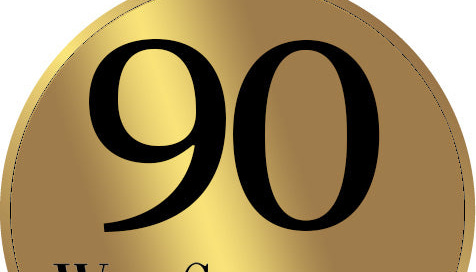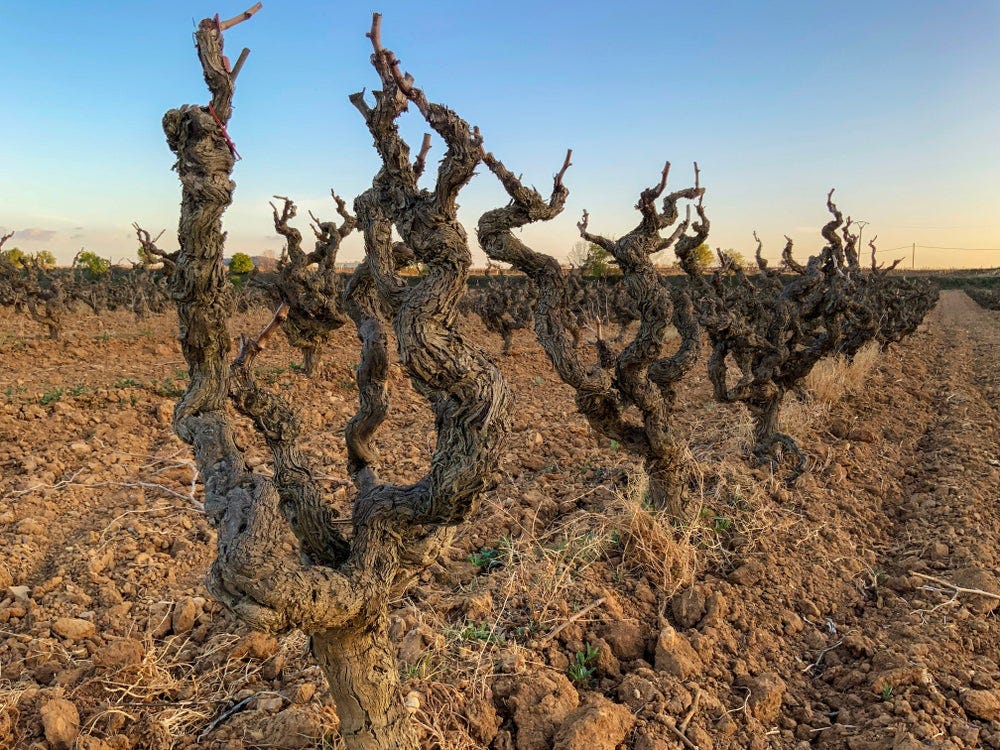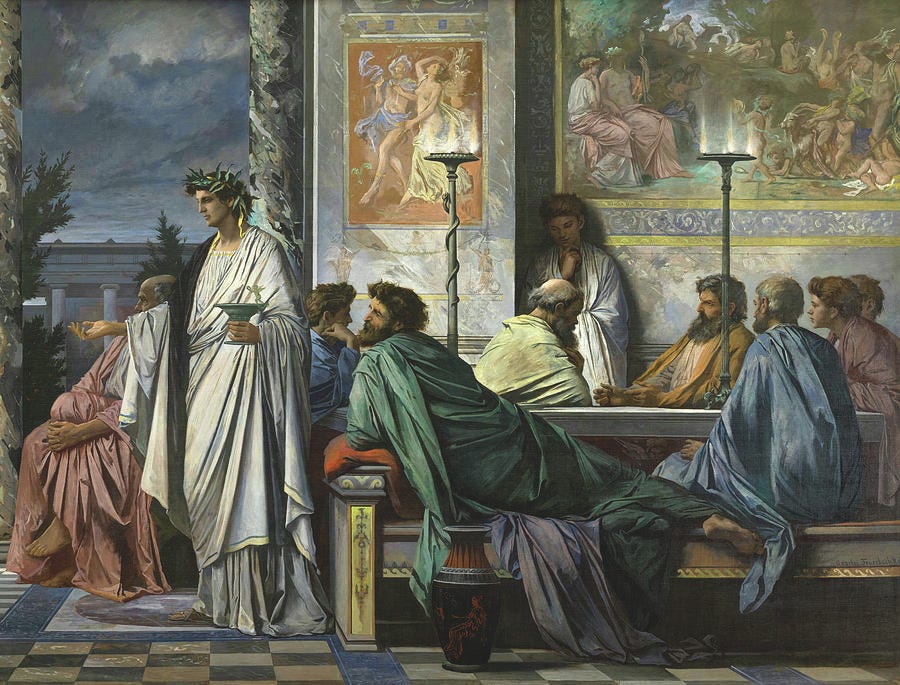Welcome and thank you for being here. Today I wanted to talk about wine in our funny times. It’s not easy to see up from down, but that should excite us about the future of the thing we love. I’ll explore three things that orient me in the confusing space of wine today.
Recently I found myself defending a very buttoned-up and farty bottle of Dolcetto at my new and ideologically-unaligned, neighborhood wine bar. The wine had broken no rules, it had broken no records, but it was just what its die-cut, gold leaf label had purported it would be. The acid was like a frozen lemon. The tannins were grippy and prevented drinking with our usual speed and purpose. But there was beautiful red fruit at the center of it all. It was a simple wine; even short. It was sulphur dead, beyond a doubt, but committed no other great crimes.
God help me, I liked it! Most of all I liked it because it was a copy of something, a version or a cover. It was a kind of dumb iteration of a thing I really like. I was sort of being advertised to, designed for, and that I found exciting, if troubling. I had to admit that I enjoyed the simple pitch, the passivity and the friendliness. I wasn’t challenged, I wasn’t moved, but I saw the ball go in the net and that gave its own strange satisfaction. Here, here! I might’ve blurted above my cravat and ballooning paunch. Racking up years of life, one finds that you can age into certain ideas. At my barstool, surrounded by Carhardtt, I thought I’d try to do so with grace.
But I’m not so old! Sitting there, I’d done an astral projection onto a place outside of the outer-boroughs, where my thirty-five years might have yielded something more adult, a position in my community, or at least a calcifying and conservative ideology about natural wine. I should have sons? Someone at whom to lecture.
I read “Authentic Wine,” by Jamie Goode when I really want to get confused. You can only imagine (or else simply read) how much ink is dedicated to the question of American rootstock as it pertains to the quality of European wine. Even and up until the teen aughts, this seemed to be a theme in critical wine writing. This fact speaks to my tender young age, I think, since all the pre-phylloxera vineyards are mostly dead or re-planted and I’m too young to remember enough of them to have formed an opinion. Soon enough, we’ll all be too young for such a thing and the point will have been made mute — if it isn’t already.
Later in the week I hosted dinner for a friend in the neighborhood. She brought a bottle from a tiny, natural wine shop where she is a regular customer. Sadly, she was dismayed because she’d picked a bottle from the “$25-and-under” shelf and, out of politeness, asked the teller what she thought.
“Oh, yes, that’s dumb girl wine. Simple, basic, Sauvignon Blanc…”
What could be more fun than choosing a wine based on your tax bracket then being called dumb for doing so! Happily, my guest found great enjoyment in this wine because she, like so many of us, are very exhausted by this kind of madness — these ridiculous pockmarks of wine hell . And boy howdy I’d have thought that Natalie Gaubicher’s “Suzette” might’ve had enough natural wine bona fides to garner a bit more respect than that. My first week at Uva, a drummer and natural wine expert described her pet nat to me as, “Hippy vinegar.” How far we’ve come…
What’s clear is not much:
The old man wine I once loved to hate, I am suddenly hating to love!
The seasons of wine fashion seem disjointed, with one grandiose non-sequitor following the next, and very little epistemic base shared between.
Wine’s ethical/political/class coding strengthens at its ends into a kind of zeal about wine "good” and “dumb.”
The code shift in the international style of my youth serves as a partial explanation here. Where we once sought out tannin, structure, and longevity; tension, acidity and downright fruitiness seem to be synonymous with what the wine waiters tell me is “a more classically styled wine.” Once, the classics were Bordeaux, Napa, and Amarone. Maybe “classical” means “neo-classical” like “before the modern era,” as in, “wine like Plato drank.”
No, it just means Burgundy. The center of gravity has slowly, then quickly, moved away from the Cru Classé to the Côte d’Or. Take that, Robert Parker! You’re not my dad anymore. Paul Giamatti from the popular 90s wine film is. And we’re still not drinking any blanking Merlot.
Terroir, age, and culture be damned, most regular wine today seems to follow a kind of FritoLay slavishness to deliciousness. Boy, that’s good, I think a lot before being kind of bored. What the heck? This wine tastes like a fruit and has no bad parts! Even, the use of oak here is really quite measured (somms nod in approval of my good opinion).
But hey now, wasn’t it the Gaubichers, the Puzelats, and Pfifferlings who had the idea to make wine taste like fruit? Weren’t the cool kids of natural wine the ones pushing for purity of fruit, and getting rid of new oak, and eschewing the winemakers’ hand, and obeying styles, and making wine to drink today? Doesn’t our team deserve credit for making all the wines so… good? You know, DRC practices biodynamics. Perhaps you’ve heard.
There’s a very lazy argument to be made about purity tests and dogmatism obfuscating the quality and importance of natural wine (or quality wine in general), but this is a straw man argument and we’ve come a very long way from the fever pitch of 2020. This was the year of head-scratching takes, like the wine director at Jean Georges telling me that all natural wine was categorically mouse tainted, a Bostonian distributor asking me if I imported any “African American” wine, and a hip natural wine store owner telling me not to waste their time with anything that had been “dosed.” These people were few and loud and represent an extreme rarity in my professional life. Less and less, in fact.
Moreover, the younger my drinking companions are, the less ideological. They seem to scrub through a wine list the way a Spotify algorithm puts together a playlist: folk songs from the 70s, goofy British rap, Big Country, something classical… Lawless! I’ve seen as much Bitouzet-Prieur on the Super Vino Bros wine TV show as I’ve seen Mythopia. I find that a very beautiful thing, with a few caveats:
Superfluity
I have memories of sitting with one of my parents’ LPs for weeks on end, or living with the same CD in my car for 6 months. When everything is equally accessible, a kind of devaluation occurs. The economic concept is that of diminishing marginal utility. There’s a fear that we lose what is special in subtle or complex wine ex abundantia, in the superfluity of “what’s next?” If the metric for a wine of quality becomes simply its ability to please us in the moment, we will be missing out on most of the great wines of the world. Wine takes contemplation, comparison, and even derision to understand its utility. Nowhere is this danger more apparent than at our crazy wine fairs where we can taste hundreds of wines in an afternoon. Do we think the best wines are the ones that stand out?
Continuity
Variety and novelty are qualities in wine to be sought out for their own value. For many years, the natural wine community proffered bottle after bottle of life-changing, mind altering experiences I would think about for days. When the Four Horsemen opened in Williamsburg, we used to sit at the bar after our stocking shifts at Uva and Will would ask if we had any stories for him. He wanted to know if we’d tasted something new or surprising. It was just like that. It was a time of discovery and intrigue. I seek that out continually, but I’ve learned to find it in wines without bombast or funny atonality. Subtle changes in stories I’ve followed for years, emblematic examples of specific terroirs, a familiar variety in a new place, or any number of intellectual things. I blush to admit that I’m basically only ever capable of learning something about a wine if I’ve tasted something nearly identical either immediately before or after. I lack the talent or memory to really do it otherwise.
Virtue
Yes, it’s fashionable and even right to criticize the most zealous amongst our ‘natural wine’ colleagues. We hear these critiques constantly from whinging court somms, popular wine personalities, even winemakers. I think the purity tests are important and essential insofar as they target the right things. Pesticides, herbicides, fungicides, and copper sulfate are a categorical detriment to a healthy soil. We can make compromises, but that’s simply the truth. About half of the nitrogen in your body (the most abundant element in the atmosphere) was produced artificially in a factory in order to produce ammonia for the fertilization of depleted soils. Would we be able to maintain our food system without it? Unclear, but it’s a fact I find troubling.
And, so sorry, but the same argument can be made about additives in the cellar. The more sulphur we put in our wines, the more microflora we kill in the wine (indiscriminately). The result is something that is less and less recognizable as food to our digestive system. Again, there is a compromise to be made, but these are the facts. Adding sulphur to wine is a categorically subtractive process as well (to make no mention of the other ways you can kill off bacteria in wine). Maybe you kill off whatever is producing the acidic acid, but maybe you also kill a weaker yeast strain that is what makes your wine worth drinking in the first place.
In my home, all other things equal, I always opt for a wine made without sulphur, and with as holistic approach to agriculture as possible. This is not in spite of my snobbishness, but because of it. I prefer the full latitude of a wine, even with the blemishes. I see it as choosing the slightly bruised apple over the irradiated one, and I feel better because of it, no doubt.
Of course, the biggest reason for this choice is the coincident fact that nearly all the natural wine being made properly is the result of a small, family farm and not a big corporation.
I understand and have sympathy for a kind of cynicism here. We’ve seen the craft beer and artisanal coffee movements turn into a fashionable penchant for Miller Highlife and deli coffee. Sometimes the only thing worse than living in Pepsi x Cola hell is siding with the sanctimony of the artisanal beverage industry. But, that’s stupid and we should just enjoy our embarrassing fanning-out for what it is. A Budweiser here and there is one thing, but I certainly won’t be irony-chugging a bottle of Josh for anyone’s approval anytime soon (I hope).
For all this, I think humility and curiosity are the antidote. We should choose wines without the notion that one wine is as good as the next. That may be true, but it’s a matter of perspectivalism rather than relativism. There are contexts under which certain wines make sense, and perspectives which bring certain wines to light. For this reason, now more than ever, it is so important to find wine professionals/friends that you can trust. So often, the relevant story or proper pairing can completely overdetermine the experience. Now more than ever, we need the truly talented somms and expert cavistes.
Rene Descartes put Ethics at the very top of the tree of knowledge, arguing that we would need all the knowledge of chemistry, physics, psychology, and the rest in order to make the best decision. As a practical solution he suggests finding the most trustworthy person you can and following them. Nice! I like the advice of Immanuel Kant better. He also believed that there was an ultimate right and wrong, and that one must categorically follow one’s duty towards the greater good. But he also believed that it was beholden on the individual to decide for his or herself what that duty was and what the bounds of right and wrong were.
In the United States today we lack the tradition and homogeneity of a bygone era. Moreover we lack the wine culture of our European neighbors. This is good and bad. Still, far too often, a bottle of wine needs to demonstrate its value but also the rules by which it is to be judged. These make for bad wines. Either because of a rudimentary adherence to the basest notion of pleasure, or because of a broadly political commitment. We should be more skeptical of our taste buds in an attempt to learn how to enjoy something new, and less skeptical of our hard-won values in an attempt to save our livers for wines that matter.
Further Reading
Curtola, Nick, et al. The Four Horsemen: Food + Wine for Good Times. Abrams, 2024.
Descartes, René. Discourse on Method. New York : London :Macmillan ; Collier Macmillan, 1986.
Goode, Jamie, and Sam Harrop. Authentic Wine (toward Natural and Sustainable Winemaking). University of California Press, 2011.
Payne , Alexander, director. Sideways. Fox Searchlight , 2004.
Kant, Immanuel. Prolegomena to Any Future Metaphysics That Will Be Able to Come Forward as Science Cambridge [England] ; New York :Cambridge University Press, 1997.










Insightful, thank you!
This is awesome. Dripping with wisdom!